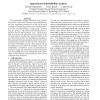Free Online Productivity Tools
i2Speak
i2Symbol
i2OCR
iTex2Img
iWeb2Print
iWeb2Shot
i2Type
iPdf2Split
iPdf2Merge
i2Bopomofo
i2Arabic
i2Style
i2Image
i2PDF
iLatex2Rtf
Sci2ools
RTSS
2002
IEEE
2002
IEEE
Approximate Schedulability Analysis
The schedulability analysis problem for many realistic task models is intractable. Therefore known algorithms either have exponential complexity or at best can be solved in pseudo-polynomial time, thereby restricting the application of the concerned models to a large extent. We introduce the notion of “approximate schedulability analysis” and show that if a small amount of “error” (which is specified as an input to the algorithm) can be tolerated in the decisions made by the algorithm, then this problem can be solved in polynomial time. Our algorithms are analogous to fully polynomial time approximation schemes in the context of optimization problems. We show that this concept of approximate schedulability analysis is fairly general and can be applied to any task model which satisfies certain “taskindependence” assumptions. Lastly, we substantiate our theoretical results with experimental evidence and clearly show the tradeoffs between the running time of the schedulabil...
Approximate Schedulability Analysis | Control Systems | RTSS 2002 | Schedulability Analysis | Schedulability Analysis Problem |
Related Content
| Added | 15 Jul 2010 |
| Updated | 15 Jul 2010 |
| Type | Conference |
| Year | 2002 |
| Where | RTSS |
| Authors | Samarjit Chakraborty, Simon Künzli, Lothar Thiele |
Comments (0)

